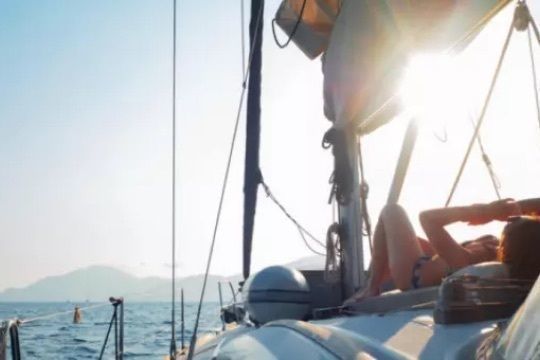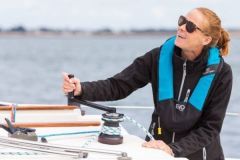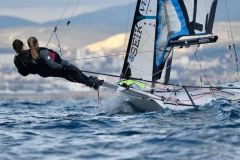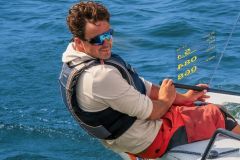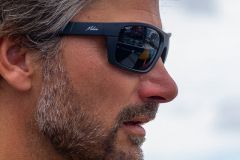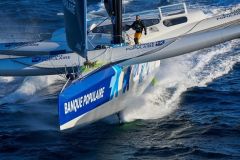When it comes to intense exposure on the water, why do you need to be extra vigilant?
Sailing under the sun is an immense pleasure, but also an underestimated risk. At sea, ultraviolet radiation is accentuated by reverberation off the water, sails and deck of the boat. Unlike dry land, where trees and buildings provide natural shade, the marine environment exposes the body to constant sunlight, with no natural protection. And to make matters worse, the often refreshing sea breeze can mask the burning sensation. As a result, sunburns occur faster and more intensely. Over the long term, this overexposure can cause skin lesions, accelerate skin ageing and affect eye health. So you need to be constantly vigilant, even under cloudy skies.
Sunscreen, an essential part of every yachtsman's routine
Sunscreen is a must-have for any sea outing. But it's important to choose the right formula. High SPF products, ideally 50 or 50+, guarantee effective protection against UVA and UVB rays. It's essential to choose creams that are resistant to water and perspiration, and if possible respectful of the marine environment, avoiding chemical filters such as oxybenzone or octinoxate, which are harmful to ecosystems. Apply generously, at least 30 minutes before exposure. No area should be neglected: nape of the neck, ears, tops of feet, hands, or even the hollows of the knees. When sailing, it's best to keep a tube in the cockpit to renew the application every two hours, or as soon as a passage through the water or an intense maneuver has altered the protection.
Anti-UV technical clothing, when textile becomes your best barrier
On board, clothing plays a vital role in the fight against the sun. The best protection is mechanical, i.e. that which physically blocks the rays. Technical textiles designed for nautical activities combine lightness, breathability and UV protection. A long-sleeved UPF 50+-certified T-shirt protects arms and back without overheating. Some models even feature an integrated hood to cover the nape of the neck. As a complement, light pants or leggings keep your legs protected. Hats are also a good choice: a cap with a long peak or a wide-brimmed hat offer valuable protection for the face. Chokers, meanwhile, provide a practical solution for quickly covering cheeks, throat or ears. Today, these garments are available in a wide variety of cuts and styles, suitable for summer conditions as well as the sportiest regattas.
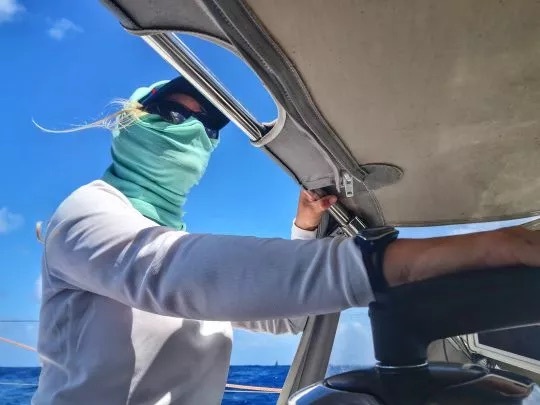
Sunglasses, essential eye protection
On a boat, the eyes are particularly exposed to solar aggression. Water reflects up to 80% of UV rays, considerably increasing the risk of eye damage. Sunglasses are therefore not just a comfort accessory, but a genuine safety piece of equipment. It's essential to choose a pair with polarized lenses, which reduce glare while filtering out 100% of UVA and UVB rays. Wraparound frames limit lateral light entry. For the more active, a holding cord or floating system prevents accidental loss during maneuvers. Children and adults alike must wear glasses on board, whatever the weather.
Creating shade on board, an often overlooked yet vital solution
When the sun is at its zenith, shade becomes a precious commodity. Depending on the type of boat, it is possible to create shaded areas on board. On sailboats, the traditional sun awning remains a simple and effective solution. On powerboats, the bimini is a practical, flexible folding structure. For open or semi-rigid boats, the more rigid T-top provides permanent cover for the cockpit. There are also furling shade sails, to be stretched at anchor to protect relaxation areas. The choice of fabric is important, and it's best to opt for a light-colored, UV-resistant fabric that's easy to set up, so as to adapt to the sun's course as the day progresses.
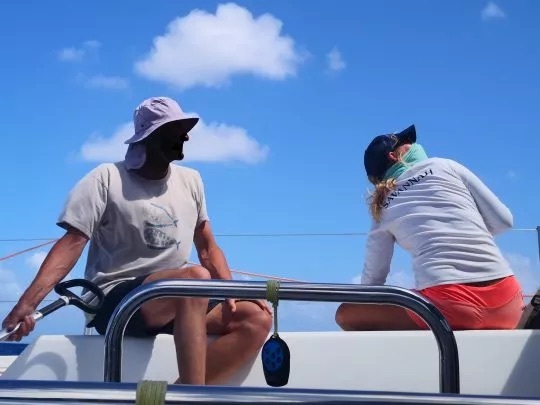
Hydration, a preventive measure never to be neglected
Heat and prolonged exposure accelerate dehydration, often without you realizing it. It's crucial to drink regularly, without waiting until you feel thirsty. At sea, the body loses a great deal of water and mineral salts, particularly during sustained physical activity. Carrying a sufficient supply of water is therefore imperative. It's also advisable to eat electrolyte-rich foods, such as fruit or salty snacks, to maintain a healthy balance. Alcoholic or sugary beverages, often tempting as an aperitif or at anchor, have the opposite effect, accentuating dehydration and fatigue. Good hydration also makes it easier to bear the heat and prevent heatstroke.
Children on board: reinforced measures for optimum protection
Children are particularly sensitive to the effects of the sun. Their thinner, less pigmented skin burns quickly. That's why it's essential to impose strict protection rules on them, right from the moment they board the plane. Long-sleeved anti-UV T-shirts, hats covering the nape of the neck, sunglasses with an elastic band to hold them in place, high factor sun cream... everything must be in place from the very first moment on board. They also need to be regularly hydrated, with plenty of time for breaks in the shade. Even for short outings, precautions must remain the same: sunburn can occur in less than an hour and compromise the rest of the cruise.
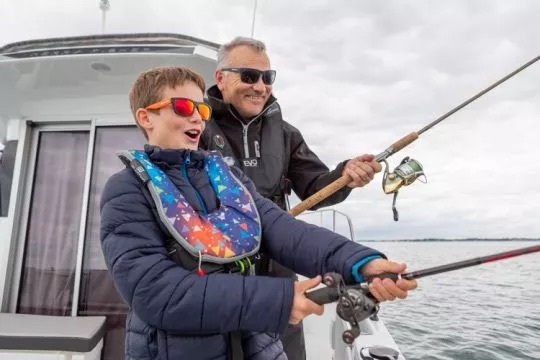
Reacting to heat or sunstroke
Despite all precautions, it can happen that a crew member suffers heatstroke or severe sunburn. In such cases, you need to react quickly. The first step is to get the person to lie down in a quiet, shady position. Then, it's a good idea to get the person to drink in small sips, and cool the body with wet cloths, especially on the forehead, neck and wrists. If the skin is burnt, the application of an aloe vera-based gel can bring relief. It's crucial to keep an eye on your general condition: dizziness, headaches, nausea or mental confusion should be a warning sign. In case of doubt, or if the situation worsens, it is imperative to contact the maritime rescue services (CROSS) and return to dry land as soon as possible.
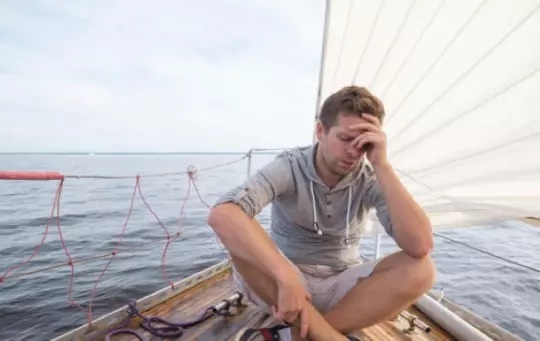
Protected sailing means longer sailing
Sun protection at sea is neither a detail nor an option. It's essential if you want to enjoy your sailing to the full, whether you're on a day trip, a cruise or a regatta. Equipping yourself correctly, anticipating your needs, remaining vigilant at all times - these simple gestures can make all the difference. The sun is a magnificent but demanding companion. Let's learn to respect it, so we can enjoy its benefits without suffering its dangers.

 /
/ 